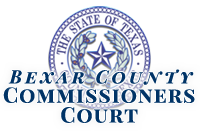Queta Rodriguez is the Regional Director of FourBlock, A Career Preparation Nonprofit Organization for Assisting Veterans seeking employment after military service and a former political candidate in Bexar County. She will soon be featured on the US Department of Veterans Affairs “Veteran of the Day” Biographical Blog, written by our own Guillermo Osorio, who serves as a writing intern for the VA DME team. Once the blog is posted and published, it will have a link to the article published in the Veterans Section of the upcoming BCDP News Digest.
We had the opportunity to get some Q&A from Bexar County’s own Veteran, US Marine Corps Capt. Queta Rodriguez and receive her personal views on issues that have affected Bexar County. We hope that our readers enjoy this exclusive interview, and if you would like to know more about Queta you can find her on Twitter @quetalrodgriguez. Here’s what the Regional Director of FourBlock had to say:
GO: What are you seeking in terms of changes to leadership or management at the city and county level after the fallout of the winter storm?
QR: Leaders taking responsibility and accountability, you cannot fix something without acknowledging that it’s broken. We saw some huge failures by city and county leadership during the freeze, now we understand that you can’t control the weather. The power outages were the failure of leadership at the state level, but the local response was also a failure. We had a complete failure with a lack of preparedness, responses were extremely slow, leaders take responsibility for the things that they are in control of. For things that are in your sphere of influence you have to take responsibility and hold people accountable. That is something that is needed and needs to be discussed so that would be the first step in solving this problem.
Secondly, we obviously failed to respond to the procedures that we already had in place for emergency response. I know that there is a committee currently going over those items. There could be the public perception that we are looking at some magical thing that we can point at rather than really taking a holistic approach to look at the things that we did and didn’t do well and then address those issues. When I say holistically I mean examine the publicly funded entities such as CPS or SAWS, boards and commissions where we have political appointees assigned, board members and directors that failed to take care of our most vulnerable people where San Antonio Housing Authority (SAHA) is one of them. No one has accepted responsibility for the failures and tragically for the experience many of these people in the city endured, especially our most vulnerable residents during the winter freeze.
I think it wasn’t so much of an organizational failure as it was leadership, leaders at multiple levels. There was no unity of command, no unified communication, lack of communication with the public, with the county and city leadership, elected officials, city manager, county manager. There are plans in place, emergency operations written and for some reason it seems like nobody followed them as if they were put to the wayside almost as if we never experienced an emergency crisis before. They might not have been as severe as this, but we have gone through crisis situations in the past, we have been a host refuge for others going through similar situations however we couldn’t do it for ourselves. As a whole, I think our city and county leadership failed. If you look at last year with COVID-19, we have seen our city and our mayor, our county judge or the judge’s representative on television. Every single day on television gave us the daily update, regurgitating numbers yet we didn’t see either one of them for five days into the winter storm and that was despite the fact that we had emergency declarations that they had signed stating that there was severe or significant risk of injury or death to our citizens. So, in my mind, that was a huge failure. Our responses were slow, and there are multiple examples of this but as a whole, no one stepped up to say obviously we are having an extreme crisis and somebody needs to step up to be in charge and show some leadership. I think it’s kind of an all-around failure. There wasn’t an acceptance of responsibility on either side. Even if we didn’t know who was responsible at the time, the point was we were in the middle of it and no one stepped up. We had a few elected officials doing some good things and I give them credit for that, but they were operating independently where they would go to their precinct area and hand out water or food baskets but overall, nobody wanted to take charge of the crisis. It was handled in an incoherent way, absolutely.
GO: What do you think should be the criteria for qualified personnel in these particular leadership roles?
QR: We have our legal criteria of course and I don’t think you need to be in a particular profession to be in a politically elected role. We do elect people, we expect that they are there when we need them, and trust that they will be there the most in times of crisis, and it was extremely disheartening and disappointing to see that we didn’t have that. I think that if you have a sense of duty, a sense of compassion, a sense of responsibility, that it’s your job to get people through this that is what really matters most. You don’t have to be the most experienced, you know there are people whose job it is to handle certain functions, we have an emergency operations management center that was set up. We have people in charge of public transportation, we have people in charge of our fire and police departments, we have people in charge who have experience to do these things but what they needed was someone to bring everybody together. We have people in charge of communications to the public, our public information offices, all of those things. There wasn’t any presence of centralized coordination, and we did have EMT but it seemed like everybody was doing their own thing and elected offices were doing their own thing, and at the end of the day the people who paid the price were the residents. You and I are able bodied enough to take care of ourselves through the cold, but there are a lot of senior citizens and disabled residents that just do not have that ability. They suffered significantly, I talked to some of these people that have post-traumatic stress from that experience. We understand that we cannot control the weather, but we could have been proactive and we simply were not. We failed badly.
GO: What could current leadership at the city and county levels do at present in order to address the poor responses by SAHA and management personnel as there have been a number of deaths recorded on their watch?
QR: First off, we need to hold people accountable. If this were a corporation, someone would have been fired already. If this were the military, people would have been relieved of command. You just don’t leave people out to die, you just don’t do that and that’s what they did, so you start with accountability. We already know SAHA, for example, there’s an emergency plan prepared and developed by HUD in 2016 that’s a directive for everyone to create their own emergency procedure, to conduct training with residents, training with staff, none of that was done. In my opinion, if you are put into a position to do something and you fail to do it, then you are no longer able to serve in that position. You failed to serve the public. Accountability first and foremost and no one has taken responsibility which is what we have seen a lot of is that we are going to do this or that. Yeah great, but we can fix those things moving forward, but until you acknowledge that you actually failed, and acknowledge that you did something wrong, then really it all looks like all you’re doing is putting on smoke and mirrors.
“Semper Fidelis” A Conversation with Queta Rodriguez












